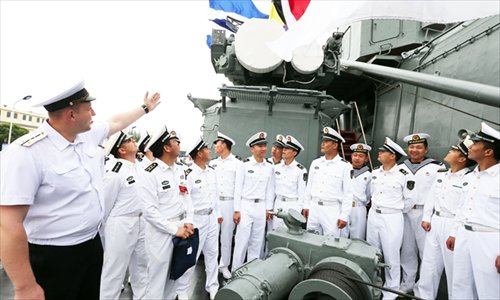Putin likely to ink record number of agreements

Chinese naval officers visit a Russian guided missile cruiser at a military port in Shanghai on Monday. Photo: CFP
Russian President Vladimir Putin's state visit to China, which starts Tuesday, is expected to yield much needed political and economic results, including a potential conclusion of decade-long talks over a bilateral gas deal, amid Western sanctions against Moscow.
Chinese President Xi Jinping will hold talks with Putin in Shanghai, where they are expected to witness the inking of "a record number of agreements," according to Russian media.
A deal to export Russian natural gas to China is widely expected to crown the visit.
In a joint interview with Chinese media prior to his visit, Putin said Russia and China have been steadily moving toward the establishment of a "strategic energy alliance."
He revealed that the deal to export natural gas to China has entered the "final phase," which could diversify Russia's pipeline routes for natural gas supply.
The deal between Gazprom and China National Petroleum Corp has been on the negotiation table for over a decade.
Once finalized, Russia will supply 38 billion cubic meters of natural gas annually to China for 30 years. Supply would begin no later than the end of 2018.
"It is high time for both countries to make the deal now," Lin Boqiang, director of the China Center for Energy Economics Research at Xiamen University, told the Global Times, citing Moscow's strategic shift to the Asian market as Europe seeks to cut reliance on Russian energy imports following the Ukraine crisis.
For China, it will help it to curb the use of coal to combat smog, Lin added.
However, the two sides have yet to iron out differences over the base price of the price formula, according to Rossiya 24 television.
Analysts expect a concession by Moscow in the bargaining, with the Wall Street Journal noting time is in China's favor as Russia comes to the table with fewer options than ever before.
If Russia makes a concession on the price negotiation and sign the deal, it would be a milestone for China and Russia in energy cooperation, Lin said, as "it could bring more energy deals in the future and reduce China's reliance on limited sources for gas import."
In addition to the gas deal, Putin also told Chinese media that the two countries are implementing a list of joint projects in 40 priority areas with a total investment of $20 billion, and set a trade target of $100 billion in 2015 and $200 billion in 2020.
The Russian leader described China as a "reliable friend," and noted expanding cooperation with China is undoubtedly Russia's diplomatic priority.
Li Xing, director for Russian studies at the School of Political Science and International Studies at Beijing Normal University, told the Global Times that Russia's standoff with the West and China's seeking for regional stability amid rows with neighbors serve as strong motivations for Beijing and Moscow to strive for a successful meeting.
On Tuesday, Xi and Putin will attend the opening ceremony of a joint naval drill.
The China-Russia exercise, the third of its kind, will run until May 26 in the northern waters of the East China Sea.
Though the Chinese military has said the drill is not targeted at a third party, it drew attention from Japan, which is locked in a territorial dispute with China over the Diaoyu Islands in the East China Sea.
"Moscow used to hold an ambiguous stance over the Diaoyu Islands. The drill will certainly put pressure on Japan as it could demonstrate that Russia is standing by the Chinese on the Diaoyu Islands issue," Li said Monday.
It will also present a political gesture to protest against US sanctions toward Russia, as well as Washington's intervention in China's territorial disputes with Japan, Li added.
Putin will also attend a summit of the Conference on Interaction and Confidence Building Measures in Asia held in Shanghai.
Newspaper headline: China-Russia gas deal close to finalization